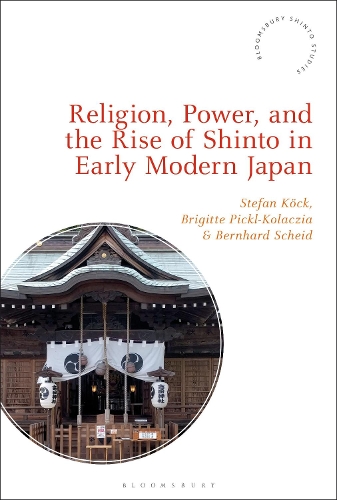
Religion, Power, and the Rise of Shinto in Early Modern Japan
(Hardback)
Available Formats
Publishing Details
Religion, Power, and the Rise of Shinto in Early Modern Japan
By (Author) Stefan Kck
Edited by Brigitte Pickl-Kolaczia
Edited by Bernhard Scheid
Bloomsbury Publishing PLC
Bloomsbury Academic
1st July 2021
United Kingdom
Classifications
Tertiary Education
Non Fiction
Asian history
201.720952
Physical Properties
Hardback
304
Width 156mm, Height 234mm
599g
Description
This book sheds new light on the relationship between religion and state in early modern Japan, and demonstrates the growing awareness of Shinto in both the political and the intellectual elite of Tokugawa Japan, even though Buddhism remained the privileged means of stately religious control. The first part analyses how the Tokugawa government aimed to control the populace via Buddhism and at the same time submitted Buddhism to the sacralization of the Tokugawa dynasty. The second part focuses on the religious protests throughout the entire period, with chapters on the suppression of Christians, heterodox Buddhist sects, and unwanted folk practitioners. The third part tackles the question of why early Tokugawa Confucianism was particularly interested in Shinto as an alternative to Buddhism and what Shinto actually meant from a Confucian stance. The final part of the book explores attempts to curtail the institutional power of Buddhism by reforming Shinto shrines, an important step in the so called Shintoization of shrines including the development of a self-contained Shinto clergy.
Reviews
[T]he expertise brought by the authors provides a valuable resource for scholars of this period, and the diverse topics covered show that the relationship of Shinto with institutional power in the Edo period is multifaceted and does not lend itself to any sort of simple, linear progression building up to the eventual centralization of shrines. * Reading Religion *
[T]his volume is heartily recommended to scholars of East Asian religions. * Religious Studies Review *
Religion, Power, and the Rise of Shinto in Early Modern Japan is an important contribution to the study of the relationship between religion and politics in the Edo period. ... offers a significant addition to our knowledge of the religious history of Edo Japan, which will be of great use to scholars and students alike. * Monumenta Nipponica *
This collection represents the highest standards of research on Shinto and should become required reading for Japanese studies. * Helen Hardacre, Professor of Japanese Religions and Society, Harvard University, USA *
Religion, Power, and the Rise of Shinto in Early Modern Japan makes a field-transforming contribution by highlighting the 17th century as a key moment, indeed a turning point, in Japanese religious history with important ramifications for the history of Shinto and government religious policy. * Luke Roberts, Professor of History, University of California, Santa Barbara, USA *
Author Bio
Stefan Kck is a postdoctoral research fellow at the Austrian Academy of Sciences, Austria. Brigitte Pickl-Kolaczia is a doctoral candidate at Austrian Academy of Sciences, Austria. Bernhard Scheid is a senior researcher at the Austrian Academy of Sciences, Austria.
